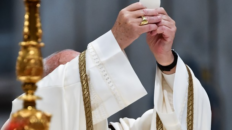Prayer shows up all throughout the Bible. If prayer is heartfelt conversation with God, then we find it as early as Adam’s interactions with God in the garden of Eden. We also see it as late as the prayer for Jesus Christ to return again in glory at the end of the book of Revelation. There are countless examples of individuals offering up prayers to God within the Bible. And there is a whole book of the Bible—the Psalms—that is made up entirely of prayers.
One of the consistent themes in the New Testament’s teaching about prayer is that we can be assured that God will hear and respond to our prayers. The apostle John points to this when he says, “This is the confidence we have in approaching God: that if we ask anything according to his will, he hears us” (1 John 5:14 NIV). This is a wonderful message! It tells us that God knows our needs, and that God absolutely expects us to bring our needs to him through prayer.
One way to think about prayer in the Bible is to look at the different types of prayers that we find. Perhaps the easiest way to think about the major biblical modes of prayer is through the acronym “ACTS.” It stands for Adoration, Confession, Thanksgiving, and Supplication. The four types of prayer that go by these names are found in many places in the Bible.
Prayers of Adoration
A prayer of adoration is a prayer that praises God’s goodness and majesty. In the Bible, we find prayers of adoration in the Psalms, which are often called psalms of praise. For instance, Psalm 111:
Praise the Lord!
I will give thanks to the Lord with my whole heart,
in the company of the upright, in the congregation.
Great are the works of the Lord,
studied by all who delight in them.
Full of honor and majesty is his work,
and his righteousness endures forever.
He has gained renown by his wonderful deeds;
the Lord is gracious and merciful.
(vv. 1–4 NRSV)
Prayers of Confession
A prayer of confession is a searching prayer of the heart. When we confess, we bare our souls before God about our sins and shortcomings. Confession to God is also a model for the kind of mutual confession that believers in the body of Christ are called upon to make to one another (see James 5:16). But ultimately, since all sin is sin against God, we are called to confess our sins to God. A key part of the good news of Jesus is that repentance can bring forgiveness and new life. Indeed, the Bible assures us that sincere confession before God will be met with forgiveness. We see this in 1 John 1:9 which says, “If we confess our sins, he who is faithful and just will forgive us our sins and cleanse us from all unrighteousness” (NRSV). So prayers of confession ought to be a regular part of our spiritual lives, as we become transformed into the people God would have us be.
Prayers of Thanksgiving
A prayer of thanksgiving is a prayer that recognizes the good things God gives us and offers thanks for them: our lives, our health, our families, and our faith. The apostle Paul told us, “Rejoice always, pray without ceasing, give thanks in all circumstances; for this is the will of God in Christ Jesus for you” (1 Thess. 5:16–18 NRSV). A part of what it means to live faithfully is to live out of a deep sense of gratitude for all that God has done for us. Prayers of thanksgiving help us to do that. They give proper thanks to God and also shape us into thankful people at our core.
Prayers of Supplication
A prayer of supplication is a prayer that lifts up requests before God. Supplications are often divided between those requests we make for ourselves (petitions) and those requests we make on behalf of other people (intercessions). We can turn again to the apostle Paul, who told us in Philippians, “Do not worry about anything, but with prayer and supplication with thanksgiving let your requests be made known to God” (v. 4:6 NRSV). It is natural for us to ask God for the desires of our hearts, and we can be assured that God will answer our prayers. Just so, we feel the need to pray on behalf of others as well—our family and friends, as well as those whose needs we know even if we do not know them personally. God does answer prayer, even if we need to be mindful that God’s answers to prayer are not always the answers we want God to give!
There are other types of prayer in Scripture beyond the four in the ACTS model. Anyone familiar with the Psalms will know that prayers of lament make up a great part of the Psalter. These lament prayers are a particular type of prayer all their own. In addition, there are particular kinds of prayers of invocation in the Bible, calling upon God to be present in special ways. Prayers of healing fit into this category, as when the letter of James refers to the “prayer of faith” that can heal the sick (see James 5:13–15).
Even so, becoming familiar with the ACTS prayers is a great way to become more familiar with biblical models of prayer in general. When we consider prayer as one of the means of grace, our focus turns to the way Jesus shows us how to pray through his teaching and example in the Gospels. We shouldn’t be surprised to learn that Jesus’ ministry is filled with prayer. He prays in the wilderness after his baptism. He heals a man through prayer. He teaches his disciples to pray. He withdraws to lonely places when he gets overwhelmed by the crowds so he can reconnect to the Father through prayer. He prays at Gethsemane so he might have strength to face his coming crucifixion. And he even dies with the prayer on his lips, “Into your hands I commend my spirit.”
Jesus’ life and ministry are clothed in prayer. In that, he offers us a model of how to live as his followers. He invites us to be a people of prayer. We also find when we go to the Gospels that Jesus wants us to pray as well. The most precious prayer that we can pray is the prayer that Jesus taught to his disciples. It is called the Lord’s Prayer or the “Our Father.” It looks like this:
Our Father, who art in heaven,
hallowed be thy name,
Thy kingdom come,
thy will be done,
on earth as it is in heaven.
Give us this day our daily bread.
Forgive us our trespasses
as we forgive those who trespass against us.
And lead us not into temptation,
but deliver us from evil
For thine is the kingdom, and the power, and the glory,
for ever and ever. Amen.
We find Jesus teaching this prayer to his disciples in both Matthew 6:7–15 and Luke 11:1–4. If we want to be counted amongst his disciples today, we ought to offer this prayer to God daily. If you’re interested in learning more about prayer and the other means of grace that God uses to grow us, check out my book, The Means of Grace: Traditioned Practice in Today’s World.
Reference: seedbed.com




Add comment